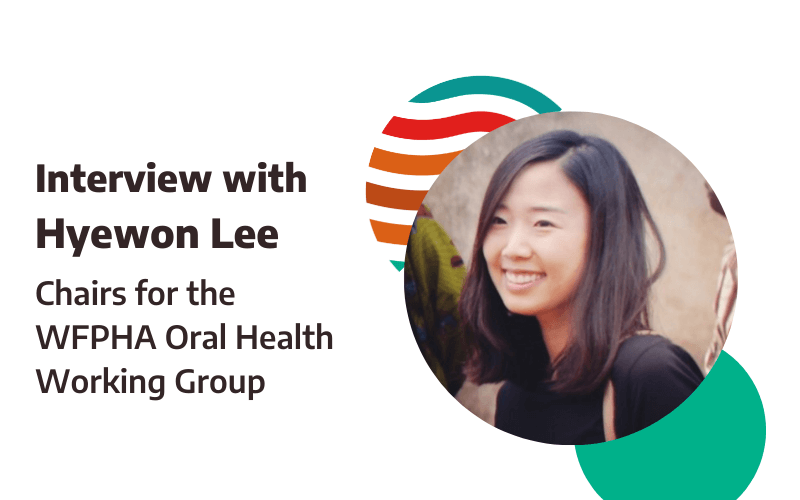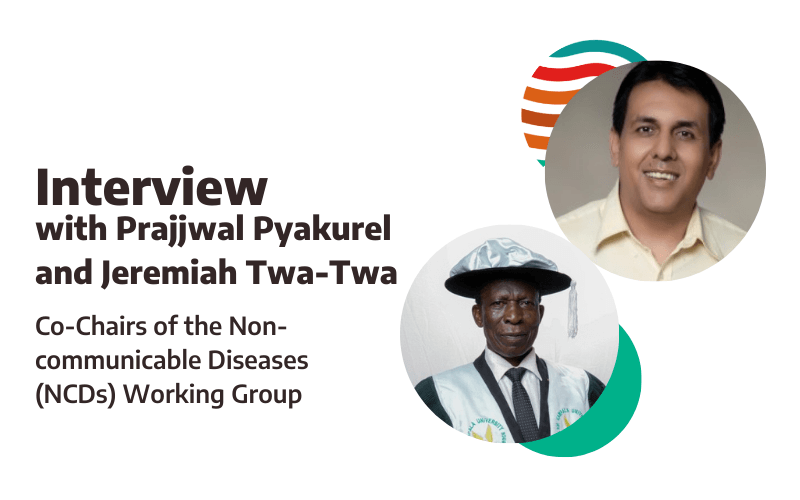
Global Health Equity and Digital Technology Working Group

Global Health Equity and Digital Technology Working Group Co- Chairs Interview: Vina Hulamm and Timothy Mackey
News
Nov 11, 2024
The intersection of digital technology and health equity is a rapidly evolving area in public health, with increasing relevance in a globalized world. In this interview, we speak with Vina Hulamm and Timothy Mackey, co-chairs of the World Federation of Public Health Associations’ (WFPHA) Working Group on Global Health Equity and Digital Technology, about their experiences, motivations, and plans for addressing health disparities through digital innovations.
Introduce yourselves, please.
Vina Hulamm: My name is Vina Hulamm, and I’m one of the co-chairs of the WFPHA Working Group on Global Health Equity and Digital Technology. I also serve as the international liaison at the American Public Health Association (APHA), where I work closely with the WFPHA.
Timothy Mackey: My name is Tim Mackey, and I’m a professor at UC San Diego. I’m also the director of the Global Health Policy and Data Institute and co-chair this working group with Vina. Together, we’re focused on using digital technology to advance health equity globally.
What motivated you to pursue a career in the public health sector
Vina Hulamm: I was motivated to work in public health when I joined the APHA. My background was originally in international development, and I had been consulting with companies in Washington, DC. Once I transitioned to APHA, I became immersed in public health and started to appreciate its various areas. It opened my eyes to how impactful public health can be.
Timothy Mackey: My motivation to pursue global public health stems from my background of living overseas in countries like the Philippines, Germany, Greece, and Japan. Being exposed to different populations at a young age made me realize the importance of health across diverse communities. I became interested in how I could contribute to the global health space, especially as global health emerged as an interdisciplinary field during my master’s program. It felt like the right place for me to have a meaningful impact.
How long have you been associated with the World Federation of Public Health Associations?
Vina Hulamm: I’ve been associated with the WFPHA since I started working at APHA, which has been almost 18 years now. My role at APHA introduced me to the Federation, and I’ve been involved in various activities ever since.
Timothy Mackey: My association with WFPHA started in 2012 when I first presented at the World Congress in Ethiopia. Since then, I’ve participated in conferences and other Federation events. I’ve been co-chairing this working group for the past two years.
Could you elaborate on your working group’s current activities and share your vision and plans for the future
Vina Hulamm: Our working group focuses on key areas, such as providing a global platform for members and partners interested in health equity and digital technology, advancing research, and supporting evidence-based policies that strengthen WFPHA’s position on digital health and health equity. For instance, we’ve organized workshops on digital health innovations, human-centered design for Indigenous health, and the impact of the infodemic on health equity.
We’ve collaborated with the WFPHA’s Indigenous Health Working Group and other working groups on sessions at global conferences like the World Congress on Public Health in Rome and the APHA Annual Meeting. We’ve also hosted online events focused on digital health literacy, health security, and infodemic management. We plan to continue these collaborations, expand our research, and engage more deeply with members across regions, especially in low- and middle-income countries.
How do the working group’s activities align with the WFPHA’s Strategic Plan?
Vina Hulamm: Our activities align closely with WFPHA’s strategic plan’s goals, mainly promoting systems change and decolonizing global health. We also support goals for advancing public health knowledge, fostering new partnerships, and strengthening member associations. Our group includes members from a wide range of geographical and professional backgrounds, ensuring that we contribute to the Federation’s mission of global health equity.
How has being part of the WFPHA network enhanced the activities of your working group and expanded its reach?
Vina Hulamm: WFPHA’s strong connections with organizations like the WHO and regional public health alliances have been invaluable. These networks allow us to engage more broadly with national associations and other working groups within the Federation. The reach of these collaborations has helped us expand the scope of our activities and engage more members, which will be crucial as we seek funding and support for future initiatives.
How has WFPHA membership advanced your group’s work on health equity issues related to digital technology?
Timothy Mackey: The WFPHA working groups have provided a space for members from diverse regions, including low- and middle-income countries, to come together and discuss the challenges and opportunities of digital tools in public health. This diversity is crucial because it allows us to hear perspectives from different health systems and understand the varied impact of digital health innovations. Through collaborations with other working groups, we can bring in voices from young professionals, indigenous communities, and other marginalized populations to better address health equity through digital technologies.
How does your working group address the digital divide to ensure equitable access to health technology?
Timothy Mackey: Addressing the digital divide is central to our working group’s mission. We’re not just focused on technology for innovation or profit but on how it can improve equity. For instance, one project we’re working on with young professionals is a systematic review of digital health literacy, which includes considerations of the digital divide across different countries. We’re also exploring co-design sessions with young professionals and racial and ethnic minorities to ensure digital tools are developed with equity principles. We want to make sure that these technologies are not only accessible but also relevant and useful to the people who need them most.
What specific resources or collaborations facilitated by the WFPHA have been most impactful for your group’s projects?
Timothy Mackey: One of the most impactful collaborations has been with the Indigenous Health Working Group, particularly on Indigenous data sovereignty—ensuring that Indigenous communities control their data. We’re working with them to develop digital tools that align with these principles. Additionally, our collaboration with the Young Professionals Working Group has been instrumental in exploring how generative AI and other emerging technologies can be designed to advance health equity. These projects are real-world examples of how our working group is leveraging the WFPHA network to make meaningful progress in digital health.
Conclusion
The work of Vina Hulamm and Timothy Mackey highlights the power of collaboration in addressing health equity through digital technology. Their leadership of the Global Health Equity and Digital Technology Working Group under the WFPHA has brought together diverse voices from across the globe to tackle some of the most pressing challenges in public health. By ensuring that digital innovations are designed with equity at the forefront, they are helping to bridge the digital divide and improve health outcomes for underserved populations. As their work continues to grow, so does the potential for digital health to transform global health equity.
Working Group Members:
– Keren Dopelt, PhD, Associate Professor, Department of Public Health, Ashkelon Academic College, Israel.
– Mariam Hachem, University of Melbourne
ACADI, Australian Center for Accelerating Diabetes Innovations Australia.
– Daud Ahmed, BSc, MPH Director of Training and Capacity building /FETP program CoordinatorNational Institute of Health (NIH) – Federal Government of Somalia.
– Swarna Weerasinghe, Associate professor, Department of Community Health and Epidemiology, Dalhousie University, Faculty of Medicine. Affiliated Scientist, Maritime Simulated Patient-Oriented Research Unit, Halifax, Nova Scotia, Canada, Biostatistician, Global Health Promise, Portland, United States.
– Nahid Widaatalla, University Health Network – Toronto, Canada.
– Tugce Schmitt, PhD, Maastricht University, The Netherlands.
– Mimmie Watts, PhD Associate Professor of Public Health, Nursing, and Leadership, Federation University Australia Chair Australian Chapter, African Science Research and Innovation Council (ASRIC), African Union Commission Professor of Research (Adjunct), Fiji National University, Australia.
– Innocent Peter, Dr. Research Scientist/Study Coordinator, Kilimanjaro Clinical Research Institute Moshi, Kilimanjaro, Tanzania.
– Jasper Tromp, Saw Swee Hock School of Public Health, National University of Singapore, Singapore, Duke-NUS Medical School, Singapore.
– Meri Koivusalo, Finland.
– Massimiliano Biondi, Medical Director at POU AST Ancona, Italy.
– Yara Aboelwaffa, Senior Digital Health Advisor – Health. Enabled Honorary associate researcher – University of Cambridge, UK.
– Tina Purnat, Harvard TH Chan School of Public Health, Serbia.
– Amy Chan, School of Pharmacy, The University of Auckland, New Zealand, Department of Practice and Policy, University College London, UK, Commonwealth Pharmacists Association, UK, International Pharmaceutical Federation, The Hague, Netherlands.
– Ramil Adhikari, Principal Advisor for the Ministry of Health/Te Whatu Ora. Executive Governance Member of the Public Health Association New Zealand (PHANZ). Chairperson of the Wellington Branch of PHANZ. Justice of the Peace in Wellington, New Zealand. Board Member of KiwiClass. Advisor to the Nonresident Nepalese Association in New Zealand. President of the Nepalese Culture and Tourism Promotion Forum New Zealand. White Ribbon Ambassador in New Zealand. Ethnic Communities Lead in the Covid Directorate (Outbreak Response). Advisor for Te Kotuku e rere within the Ministry of Health.
Member of the Technical Advisory Rōpū (TAR) of Hauora Māori Tūmatanui, New Zealand.
– Tiana McMann, MA – working group coordinator – University of California San Diego, S-3 Research LLC, USA.





Recent Comments